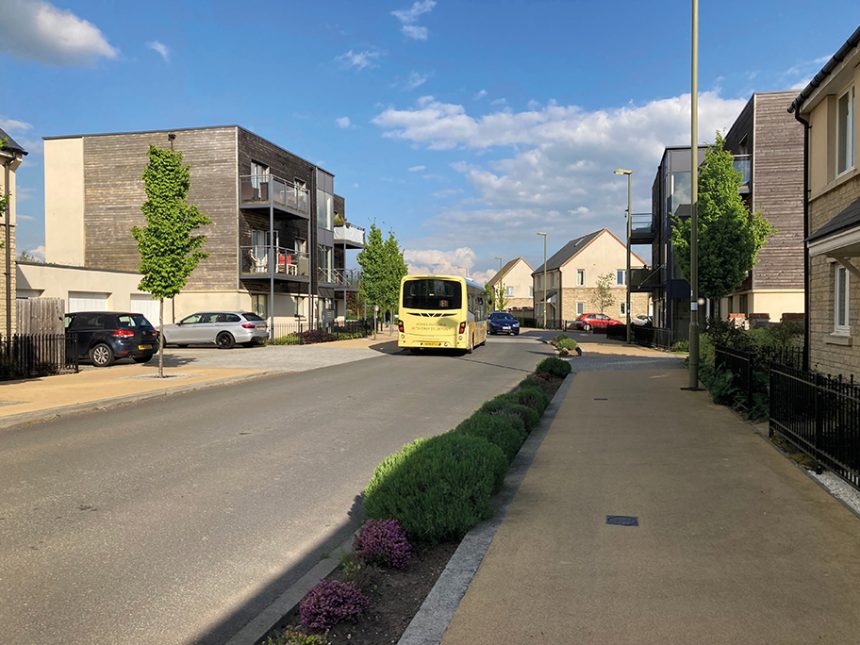No one could plausibly claim that the government does not have a packed agenda. “Move fast and fix things” may be the Transport Secretary’s mantra, but she’s not alone in having an ambitious in-tray. Housing Secretary Angela Rayner is zealously spearheading the drive to get Britain building: 1.5 million homes by the end of the Parliament.
If this target is met, new development across the country will reshape Britain. But without a bold new vision for the public transport network, one that puts coach and buses first, we risk further embedding car dependency across the UK.
Take a look at the kind of housing developments we have been building. Of the 803,000 houses built in and around city and town centres between 2011 and 2019, 91.5% have been built in suburbs.
We’ve broadly defaulted to housebuilding that locks residents into a cycle of car dependency, taking them far enough away from local amenities, while at the same time failing to provide bus services that could well capitalise on the concentration of new residents that the building of thousands of houses creates.
The development where I live is a prime example. While there is a supermarket within walking distance, the main conurbation of shops, schools, offices, and train station are located two miles away. Walking is often impractical. Moreover, the development was designed with only one access road to the nearest main road, resulting in huge amounts of backed-up traffic during peak hours. Once the school that is being built nearby finally opens, it remains a mystery as to how coaches will be able to navigate their way through.
A bus service has been established, running every 30 minutes, and finishing at 1900hrs. Worse still, the sole access road is often so congested with traffic that the bus is late and, since there is only one bus assigned to the route (it runs in a loop), with no bus priority measures, the knock-on impact is significant. This makes the bus an unattractive offer for residents, who will regularly, understandably, choose the flexibility that the car affords them.
Now is the time to take advantage of this golden opportunity, reimagine the relationship between planning and public transport – Nicholas Jessup
A genuine alternative to car dependency must infiltrate future planning. My gripes are symptomatic of a wider picture, highlighted by Confederation of Passenger Transport (CPT) members who have had their efforts to expand bus services frustrated.
Often, supportive funding offered to create a new bus service does not last long enough for the route to achieve commercial viability. In other cases, developers’ failure to build the infrastructure needed to make a bus service viable from the arrival of the first resident means that these people all too often find themselves locked in car dependency long after a bus service has been delivered, cementing a hard-to-change lifestyle. Elsewhere, overly prescriptive Section 106 orders can often have the opposite effect to what is intended, preventing the establishment of new bus routes.
CPT is calling on the government to boldly put bus first. Bus first means that, at every stage of development, developers and local authorities think about how to create genuine alternatives to car ownership, work in tandem with operators, and draw up plans that will encourage residents to leave the car at home. This means you build in bus priority measures from the beginning, incorporate adequate facilities coach and bus (driver rest stops, electric charging), and lay out a long-term vision for transport that turns the bus into the natural choice.
Communities will also benefit from planning policy that considers how coaches — which fulfil vital functions that other transport modes cannot — can be better supported. As upcoming research from KPMG (commissioned by CPT) will highlight, coaches are a lifeline for many, delivering millions of journeys that otherwise would not happen, supporting education, sport, tourism and travel, yet broadly underappreciated and suffering from insufficient attention within the planning system.
CPT will seek to work closely with the government as planning reform moves forward. Now is the time to take advantage of this golden opportunity, reimagine the relationship between planning and public transport, and deliver a bus-first vision that will herald the creation of healthier, greener and better-connected communities.



























